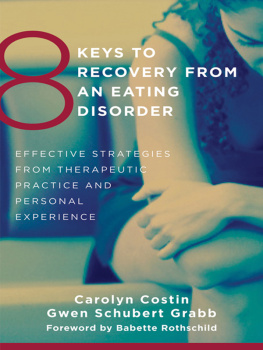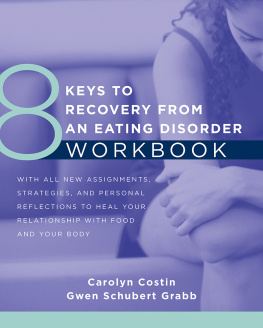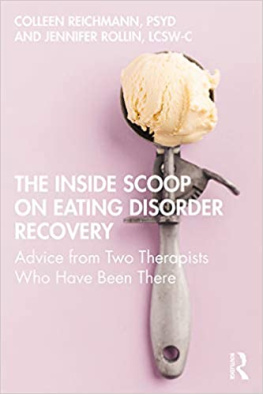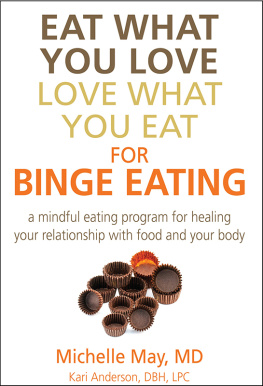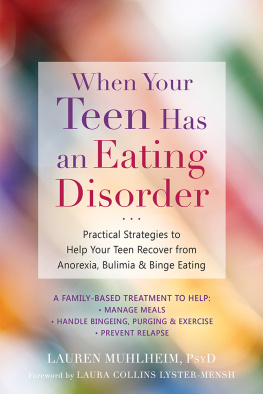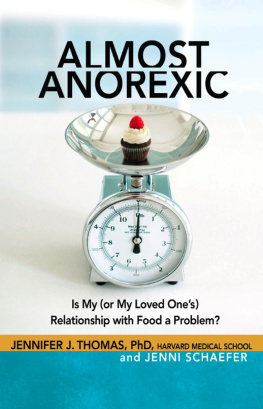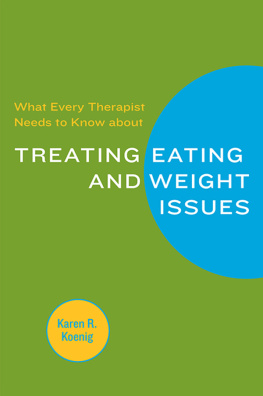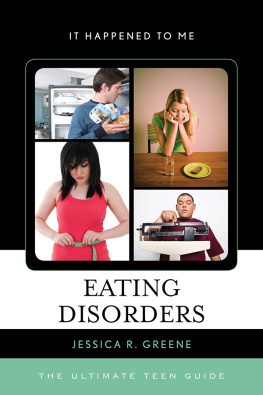Acknowledgments
I n a project of this nature, there are far more people who deserve acknowledgment and thanks than we have room for, but there are a few directly involved whom we cannot fail to mention. Babette Rothschild, thank you for giving us this amazing opportunity and paving the way. To W. W. Norton and all the people there who supported this book and helped to make it happen, thank you. Jennifer Dale zealously read our first drafts and provided valuable feedback; Tim Brewerton, Ralph Carson, Debra Gelbart, Jennie Nash, and Kate Schluter assisted with fact-checking and editing. We also each have a few personal appreciations.
Carolyn
This book and my life in general require several often unacknowledged support crew members. I could not be who I am or do what I do without them. I am filled with endless gratitude, appreciation, and love for:
My staff, who carry on the mission of love, healing, and hope at all times.
Bruce, who has never failed to see more in me than I see in myself.
My many teachers along the way, some of whom are mentioned in the text or resource section.
My soul sisters, who know the sacredness of tears and the moon (you know who you are).
My loved ones, who see me, feed my body and soul, and remind me of what is truly important; and
Gwen, who over the last fifteen years turned from client, to colleague, to friend, saying, Yes to recovery so many years ago and Yes again to co-authoring this book.
Gwen
I will forever be grateful to my husband Albert for his love, support, and patience through everything; and to my children, Ari, Jacob, and Chloe, for reminding me every day what is truly important; and to my beloved friends, my walking partners, and my confidantes. Thank you for always being there and willing to listen.
I am also deeply grateful to the people who helped me through my illness, especially: Nancy Sokolow, for her unwavering kindness, excellent care, and devotion; Erin Naimi, for helping me find freedom with more than just food; and Carolyn Costin, for always loving me, believing in me, and for continuing to inspire me with her courage, wisdom, and infinite heart.
Finally, of course, our greatest gratitude for this book goes to our clients, for teaching us, trusting us, and inspiring us to be better therapists, and for willingly sharing their experiences in our sessions and in this book.
Foreword
T he 8 Keys series was conceived to provide a library of intelligent, highly accessible bookswritten by specialists in their fieldsfor consumers who may not want or be able to afford psychotherapy. The series aims to provide these readers with readily applicable techniques to aid the recovery of the condition being discussed. Each series volume can be easily used as a self-help tool or as an adjunct to psychotherapy itself. (From a wealth of reader feedback, I know that my own book, 8 Keys to Safe Trauma Recovery, the first in this series, is used in both of these ways.) In addition, each book in the series includes background theory relevant to the featured topic to ensure that both consumer and helping professional are similarly informed. Knowledgeable consumers make better decisions about what does and does not help them. Therefore, any seeker of improved psychological health or personal growth should have access to the same information as the professionals; the theories and techniques that the psychotherapists use should not be kept a secret.
According to the Web site of the National Association of Anorexia Nervosa and Associated Disorders (ANAD), more than 20 million people in the U.S. alone suffer from an eating disorder. Moreover, they report, eating disorders account for the highest mortality rate of any mental illness. From the series inception, I hoped to include a book to help those with eating disorders. Given the prevalence of sufferers, I felt a resource for those affected was critical. Moreover, just about every helping professional encounters clients and patients with eating disorders in the course of dealing with a multitude of other presenting problems. Often an eating disorder is at the core of diagnoses such as depression or anxiety. Consumers and professionals need to consider the role of eating disorders on their own and as companions to other difficulties. Both well- and less-experienced professionals need guidelines, a logical framework, and highly usable tools to address eating disorders alone or in combination with treatment for other issues. And, finally, consumers and professionals alike need guidance to decide when seeking additional professional consultation might be in order.
Written by two psychotherapist colleagues, Carolyn Costin and Gwen Grabb, 8 Keys to Recovery from an Eating Disorder outstandingly meets all of these criteria. Costin has been a prominent figure among eating disorders professionals for decades. Her previous books, Your Dieting Daughter and The Eating Disorders Sourcebook, are both well known and valued in the field. She wisely chose Grabb, a former client-turned-colleague, to co-write the book, creating a writing team and voice that is totally uniquenot only to books about eating disorders, but books about psychotherapy altogether. By offering the dual reflections of therapist and patient, this book may remind some readers of Irving Yaloms

